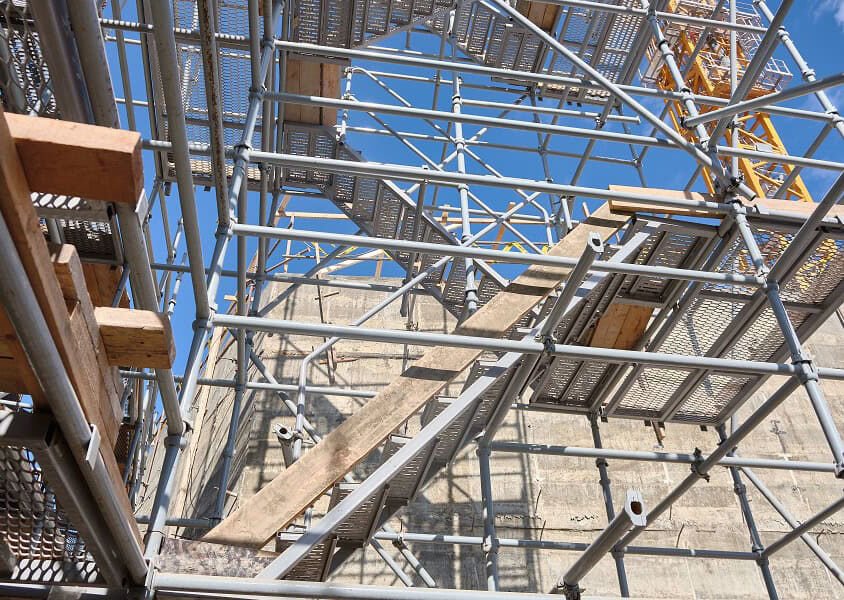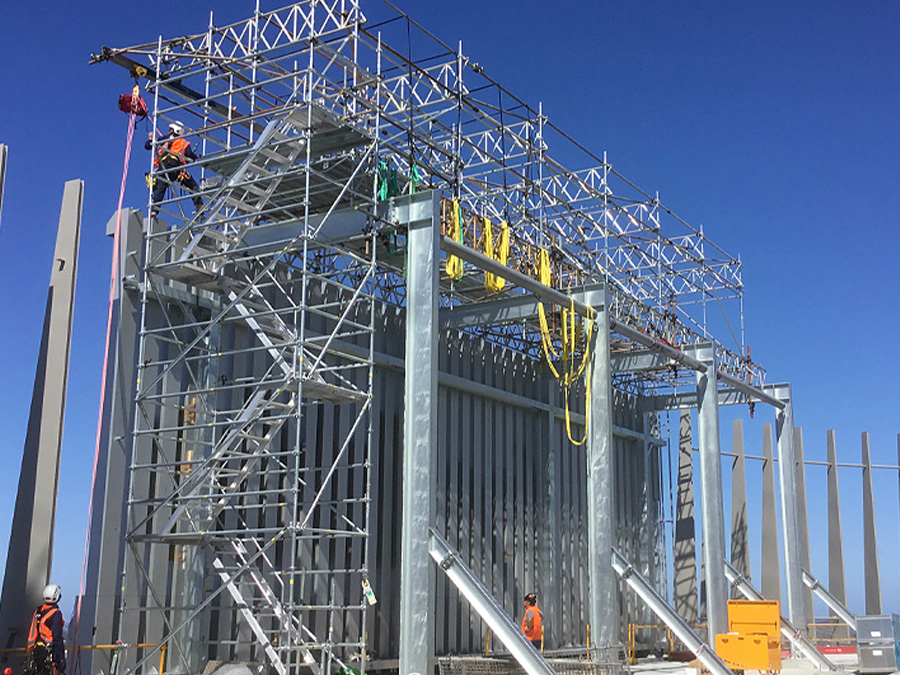The Advantages of Scaffolding for Safety and Effectiveness in Building Projects
Scaffolding is an essential component in the world of building, substantially contributing to both safety and operational effectiveness. The influence of scaffolding prolongs past fundamental safety and security actions; its tactical execution can transform job timelines and end results (Scaffolding).
Enhanced Employee Security

Boosted worker safety is an extremely important concern in the building and construction industry, where the risks connected with drops and mishaps can have alarming consequences. Effective scaffolding systems play a critical role in reducing these threats by providing stable systems for workers at raised elevations. By making sure that scaffolding is correctly put up and maintained, building companies can substantially lower the possibility of drops, which are amongst the leading reasons of workplace injuries and fatalities.
Additionally, scaffolding improves safety and security via its layout attributes. Guardrails, toe boards, and non-slip surfaces add to a secure workplace, lessening the danger of crashes. In addition, scaffolding enables workers to gain access to hard-to-reach locations without the requirement for makeshift options, which can compromise security criteria.
Training employees on the correct use of scaffolding is equally essential. Ensuring that workers are knowledgeable about lots capabilities, setting up procedures, and security methods even more improves the effectiveness of scaffolding in avoiding mishaps. In verdict, integrating robust scaffolding systems within construction tasks not just enhances worker safety and security but also promotes a culture of security that benefits the entire labor force while enhancing general efficiency.
Improved Gain Access To and Flexibility

Additionally, scaffolding enables the convenient transport of materials and tools, lessening downtime related to moving devices. Workers can effectively access various locations of a task, which is especially essential in complex builds where vertical and horizontal movement is constant - Scaffolding. This access not just simplifies procedures however additionally enables groups to react promptly to changing project demands
In addition, scaffolding can be customized to fit details website conditions, enhancing wheelchair in limited or uneven areas. This flexibility guarantees that building activities can continue efficiently, regardless of the difficulties presented by the setting. By promoting enhanced gain access to and flexibility, scaffolding plays a critical duty in sustaining construction staffs and enhancing the general performance of building projects.
Enhanced Task Performance
In construction, project effectiveness is considerably affected by the effective use scaffolding systems. By offering a secure and stable platform for employees, scaffolding reduces downtime and speeds up the rate of construction tasks. With enhanced accessibility to elevated work areas, groups can finish tasks extra promptly, reducing the overall job timeline.
The modular nature of modern scaffolding permits scaffolding supplies rapid assembly and disassembly, enabling swift shifts between various phases of a task. This adaptability not only boosts workflow however additionally adds to far better sychronisation among various trades, as multiple groups can work simultaneously on various areas of a structure.
In addition, scaffolding makes sure that workers are located properly to execute their tasks without unnecessary pressure or risk of injury, thus lowering the likelihood of mishaps that can bring about costly delays. Enhanced precaution embedded in scaffolding systems, such as guardrails and toe boards, additional assistance efficient operations by keeping worker concentrate on the job handy as opposed to security problems.

Adaptability for Numerous Projects
Scaffolding systems attract attention for their flexibility throughout a wide variety of construction tasks, with the ability of meeting certain site demands and tasks. Their modular layout enables for fast changes to suit various structure kinds, from household to business structures, making certain that employees have safe accessibility at different heights and angles.
These systems can be tailored for varied applications, such as façade job, indoor improvements, or sturdy commercial projects. Light-weight aluminum scaffolds are optimal for indoor job, while durable steel structures supply the essential support for large building and construction. The flexibility of scaffolding reaches its capability to be configured for both permanent and short-lived frameworks, permitting contractors to efficiently prepare and implement their jobs.
Additionally, scaffolding can be used in difficult settings, including metropolitan setups where space is minimal or on irregular terrain where conventional accessibility solutions are impractical. our website This flexibility lessens the requirement for several gain access to options, lowering costs and job timelines. By fitting a range of conditions and jobs, scaffolding enhances the general performance and performance of construction efforts, showing to be a crucial property in the structure sector.
Conformity With Security Specifications
How can building jobs make certain the safety and security of workers while preserving effectiveness? Regulative structures, such as OSHA in the United States, supply guidelines that regulate the use of scaffolding, making certain that it fulfills stringent security requirements.
Proper scaffolding layout and installment play a critical role in compliance. Training employees on risk-free scaffold usage and the value of conformity with security criteria even more reinforces a culture of safety on-site.
Furthermore, paperwork and record-keeping related to safety examinations and worker training are vital. These techniques not only demonstrate compliance however likewise provide responsibility and openness. Inevitably, by focusing on adherence to security criteria, building projects can foster a safer work atmosphere, thus enhancing efficiency and performance without endangering employee security.
Conclusion
In final thought, scaffolding functions as an important component in structure jobs, dramatically enhancing safety and security and effectiveness. Its design features, including guardrails and non-slip surface areas, add to a safer working atmosphere while assisting in improved gain access to and movement for employees. The modular nature of scaffolding advertises rapid assembly, therefore enhancing overall task efficiency. Furthermore, adherence to safety and security criteria highlights the importance of scaffolding in accomplishing successful task outcomes, making it important in the construction sector.
Scaffolding is an essential element in the realm of building and construction, considerably contributing to both safety and scaffolding on stairs functional performance. The influence of scaffolding expands past fundamental security procedures; its tactical execution can transform task timelines and results. In final thought, including durable scaffolding systems within building tasks not only enhances worker safety and security however also advertises a culture of security that benefits the entire workforce while boosting total productivity.
In final thought, scaffolding serves as a vital element in structure tasks, considerably improving safety and security and efficiency. Adherence to security standards underscores the value of scaffolding in accomplishing successful task outcomes, making it essential in the construction sector.